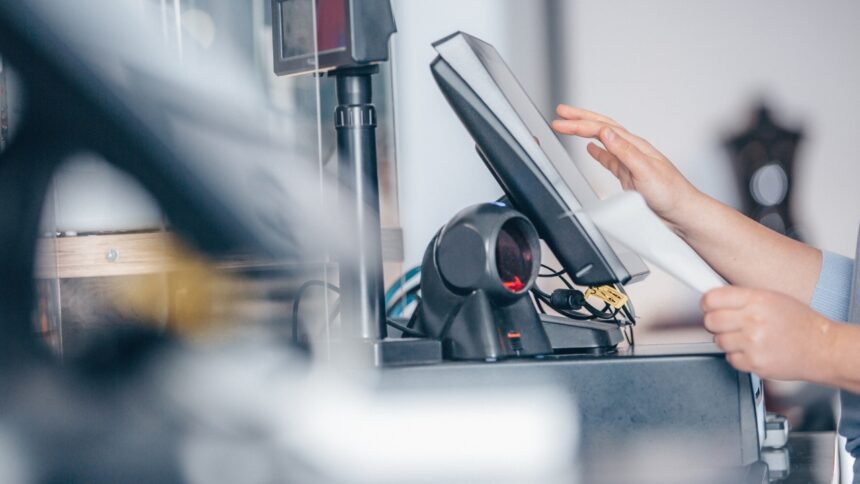Are you a small business owner drowning in receipts, spreadsheets, and the general chaos of managing sales? Finding the best POS for small business can feel like searching for a needle in a haystack. But fear not! This comprehensive guide will break down the world of Point of Sale (POS) systems, helping you navigate the options and choose the perfect solution to supercharge your business.
Decoding the POS Puzzle: Finding the Perfect Fit
Choosing the right POS system is more than just swiping cards. It’s about streamlining operations, improving customer experience, and ultimately, growing your business. To achieve this, we must understand its core functionalities and how they cater specifically to the needs of small businesses.
What Exactly is a POS System?
At its core, a POS system is the central hub of your business transactions. It encompasses the hardware and software that allows you to process sales, manage inventory, track customer data, and generate reports. In essence, it’s a digital cash register on steroids! While traditional cash registers simply recorded transactions, modern POS systems offer a wealth of features designed to simplify every aspect of running your business.
Why Does Your Small Business Need a POS System?
The benefits of implementing a POS system are numerous. Firstly, they streamline the checkout process, reducing wait times and improving customer satisfaction. Secondly, they provide valuable insights into your business performance, such as sales trends, popular products, and customer behavior. Finally, many POS systems integrate seamlessly with other business tools, such as accounting software and e-commerce platforms, creating a cohesive and efficient workflow.
The Key Features to Look For
When evaluating POS systems, consider these essential features:
- Payment Processing: The ability to accept various payment methods, including credit cards, debit cards, mobile wallets, and cash. Look for systems that offer competitive processing rates and secure payment options.
- Inventory Management: Real-time tracking of your inventory levels, automated alerts for low stock, and tools for managing product variations and pricing. This feature helps prevent stockouts and overstocking, optimizing your inventory investment.
- Sales Reporting and Analytics: Detailed reports on sales performance, product profitability, customer behavior, and employee performance. These insights are crucial for making informed business decisions and identifying areas for improvement.
- Customer Relationship Management (CRM): Tools for capturing customer data, tracking purchase history, and managing customer loyalty programs. Building strong customer relationships is essential for long-term success.
- Employee Management: Features for tracking employee hours, managing permissions, and calculating payroll. Efficient employee management can save time and reduce errors.
- Hardware Compatibility: The ability to integrate with various hardware devices, such as barcode scanners, receipt printers, cash drawers, and tablet stands. Choose a system that is compatible with your existing hardware or offers bundled hardware solutions.
- Ease of Use: An intuitive and user-friendly interface that requires minimal training. A complex POS system can be frustrating for employees and customers alike.
- Scalability: The ability to adapt to your growing business needs. Choose a system that can handle increasing transaction volumes, multiple locations, and expanding product lines.
Diving Deep: Different Types of POS Systems
There are several types of POS systems available, each with its own advantages and disadvantages. Understanding the differences between these systems will help you narrow down your choices and find the best fit for your specific needs.
Cloud-Based POS Systems: The Modern Choice
Cloud-based POS systems are hosted on remote servers and accessed through the internet. This means you can access your data from anywhere, at any time, using any device with an internet connection. Cloud-based systems are generally more affordable than traditional POS systems, as they eliminate the need for expensive hardware and software licenses. They also offer automatic software updates and data backups, reducing the risk of data loss.
Reddit users often highlight the flexibility and accessibility of cloud-based POS systems. Many appreciate the ability to manage their business remotely and access real-time data on the go. However, it’s important to consider internet connectivity as a potential limitation, as a reliable internet connection is essential for cloud-based systems to function properly.
On-Premise POS Systems: Traditional Power
On-premise POS systems are installed directly on your business’s computers and servers. These systems offer greater control over your data and are less reliant on internet connectivity. However, they typically require a higher upfront investment in hardware and software, as well as ongoing maintenance and support.
On-premise systems may be a better choice for businesses with complex needs or those operating in areas with unreliable internet access. However, for most small businesses, the flexibility and affordability of cloud-based systems make them a more attractive option.
Mobile POS Systems: Flexibility on the Go
Mobile POS (mPOS) systems utilize smartphones or tablets as the point of sale. These systems are ideal for businesses that operate in mobile environments, such as food trucks, farmers markets, and pop-up shops. mPOS systems are typically affordable and easy to use, making them a great option for startups and small businesses with limited budgets.
mPOS systems often come with features such as mobile payment processing, inventory management, and sales reporting. They can also be integrated with other business apps, such as accounting software and email marketing platforms.
Selecting Your Champion: Evaluating and Choosing a POS System
With so many POS systems available, choosing the right one can feel overwhelming. Here’s a step-by-step guide to help you evaluate your options and make an informed decision:
Step 1: Assess Your Business Needs
Start by identifying your specific needs and requirements. Consider the following questions:
- What type of business do you operate? (Retail, restaurant, service, etc.)
- How many transactions do you process per day?
- What payment methods do you accept?
- What inventory management features do you need?
- Do you need customer relationship management (CRM) capabilities?
- Do you need employee management features?
- What is your budget?
Step 2: Research and Compare POS Systems
Once you have a clear understanding of your needs, start researching and comparing different POS systems. Read reviews, compare pricing, and explore the features offered by each system.
Step 3: Request Demos and Free Trials
Most POS vendors offer demos and free trials. Take advantage of these opportunities to test the system and see if it’s a good fit for your business.
Step 4: Consider Integration Capabilities
Make sure the POS system integrates seamlessly with your existing business tools, such as accounting software, e-commerce platforms, and email marketing platforms.
Step 5: Evaluate Customer Support
Choose a POS vendor that offers reliable customer support. Look for vendors that offer phone, email, and chat support.
The Cost Factor: Understanding POS Pricing Models
The cost of a POS system can vary depending on the type of system, the features included, and the vendor. Here’s a breakdown of the different pricing models:
Monthly Subscription Fees
Many cloud-based POS systems charge a monthly subscription fee. This fee typically includes access to the software, customer support, and automatic software updates.
Transaction Fees
Some POS systems charge a transaction fee for each sale processed. This fee is typically a percentage of the transaction amount.
Hardware Costs
If you need to purchase hardware, such as a barcode scanner, receipt printer, or tablet, you’ll need to factor in these costs.
Installation and Training Fees
Some POS vendors charge installation and training fees. However, many cloud-based systems are easy to set up and use, so you may not need to pay for these services.
Expert Insights: Advice from the Trenches
“Choosing the right POS system is crucial for small business success. It’s not just about processing transactions; it’s about gaining valuable insights into your business, streamlining operations, and improving customer experience.” – John Smith, Retail Technology Consultant
The Reddit Perspective: Real-World Experiences
Reddit threads are filled with discussions about POS systems. Many small business owners share their experiences and recommendations. A common theme is the importance of considering the long-term needs of your business and choosing a system that can scale as you grow.
Some users suggest starting with a basic mPOS system and upgrading to a more comprehensive solution as your business expands. Others recommend focusing on features that are most important to your specific industry, such as inventory management for retail businesses or table management for restaurants.
Best POS For Small Business: Top Recommendations
While the best POS for small business depends on your specific needs, here are some top recommendations based on popularity, features, and affordability:
- Square: A popular choice for small businesses due to its ease of use, affordable pricing, and wide range of features.
- Shopify POS: Ideal for businesses that also sell online through Shopify. It offers seamless integration between your online and offline sales channels.
- Toast: A POS system specifically designed for restaurants, offering features such as online ordering, table management, and menu management.
- Lightspeed Retail: A robust POS system for retail businesses, offering advanced inventory management, customer relationship management, and reporting capabilities.
- Clover: A versatile POS system that can be customized to meet the needs of various types of businesses.
Mastering POS Implementation: Tips and Best Practices
Implementing a new POS system can be a daunting task. Here are some tips to ensure a smooth and successful transition:
- Plan ahead: Create a detailed implementation plan that outlines the steps involved, timelines, and responsibilities.
- Train your employees: Provide thorough training to your employees on how to use the new POS system.
- Migrate your data: Carefully migrate your existing data, such as inventory and customer information, to the new system.
- Test the system: Thoroughly test the system before going live to identify and resolve any issues.
- Provide ongoing support: Offer ongoing support to your employees to address any questions or concerns.
Beyond Transactions: Harnessing the Power of POS Data
The best POS for small business is more than just a cash register; it’s a data-gathering powerhouse. Use the data generated by your POS system to make informed decisions about your business. Track sales trends, identify popular products, understand customer behavior, and optimize your inventory. By harnessing the power of POS data, you can improve your profitability, increase customer satisfaction, and drive business growth.
Concluding Thoughts: A Smarter Way to Sell
Choosing the best POS for small business requires careful consideration and research. By understanding your business needs, evaluating different options, and implementing best practices, you can find a system that streamlines operations, improves customer experience, and drives business growth. Embrace the power of POS technology and unlock the full potential of your small business.






